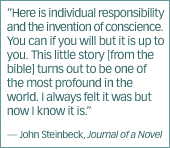Timshel—Man's Ability to Choose Between Good and Evil

Steinbeck's East of Eden is a book about us all, descendants of Cain, who, according to the New Jerusalem Bible, "appears to be the builder of the first city and ancestor of stock-breeders, musicians, smiths and possibly prostitutes." Like all of us, Cain had free will to decide between good and evil. In this semi-autobiographical work, Steinbeck does not envision a virginal Eden as our birthright. As much as we inherit Cain's curse, we also inherit his ability to redeem himself.
The main theme for East of Eden turns on the correct translation of the Hebrew word timshel, translated differently in various versions of the Bible. The word appears in the Cain and Abel story in Genesis, when God discusses sin with Cain. What is the true meaning of this passage?
(a) God promises Cain that he will conquer sin ("thou shalt rule over him")?
(b) God orders Cain to conquer sin ("Do thou rule over him")?
(c) God blesses Cain with free will, leaving the choice to him ("Thou mayest rule over him")?
By studying the passage in the Bible, Adam Trask's Chinese servant, Lee, helps characters Samuel and Adam understand the intended original meaning in this passage from East of Eden:
"...this was the gold from our mining: 'Thou mayest.' The American Standard translation orders men to triumph over sin (and you can call sin ignorance). The King James translation makes a promise in 'Thou shalt,' meaning that men will surely triumph over sin. But the Hebrew word timshel—'Thou mayest'—that gives a choice. For if 'Thou mayest'—it is also true that 'Thou mayest not.' That makes a man great and that gives him stature with the gods, for in his weakness and his filth and his murder of his brother he has still the great choice. He can choose his course and fight it through and win."Here is the choice each of the characters in East of Eden face—as does, ultimately, every human being. No matter how deep-rooted the sin, there is always a chance for redemption. In the authoritative Orthodox Jewish translation from The Chumash: The Stone Edition the passage in question reads: "Surely if you improve yourself, you will be forgiven. But if you do not improve yourself, sin rests at the door. Its desire is toward you, yet you can conquer it."
What is timshel?
Sources:
- Journal of a Novel: The East of Eden Letters by John Steinbeck (The Viking Press, Inc.,1969; Penguin Books, 1990)
- The Chumash: The Stone Edition edited by Rabbi Nosson Scherman (Mesorah Publications Limited, May 1999)



